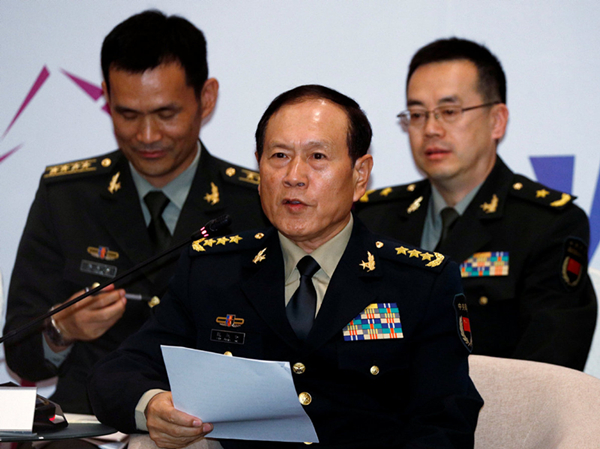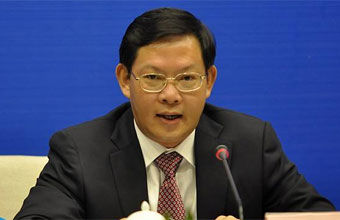Home> News
China, ASEAN build military ties for regional peace

China's Minister of National Defence Wei Fenghe speaks to ASEAN defence ministers during a meeting at the ASEAN Defence Ministers' Meeting in Singapore, on Oct 19, 2018. [Photo/Agencies]
China is expanding military cooperation with the Association of Southeast Asian Nations to ease regional tension and promote peace, not to erode the United States' long-established defense ties with countries in the region, experts said.
China and the 17 other countries at the Fifth ASEAN Defense Ministers' Meeting-Plus pledged on Saturday to jointly tackle terrorism and build confidence via practical measures, according to joint statements.
The meeting was attended by the defense ministers from 10 ASEAN countries and their eight partners - China, Russia, the United States, Australia, India, Japan, New Zealand and the Republic of Korea. Two joint statements were issued: Preventing and Countering the Threat of Terrorism, and Practical Confidence-Building Measures.
General Wei Fenghe, state councilor and defense minister, said in his speech that the Asia-Pacific region still faces many challenges in combating terrorism and only through joint efforts can these issues be overcome.
During a ninth informal meeting between China and ASEAN defense ministers on Friday, Wei said China and ASEAN countries are close neighbors and China supports building an open and inclusive regional security framework with ASEAN.
Wei said the People's Liberation Army will continue to strengthen communication with its ASEAN counterparts. Actions include setting up direct telephone lines between defense authorities, holding joint military drills, cooperating in disaster-relief and rescue operations and promoting dialogues between defense think-tanks and young military officials.
The Chinese and ASEAN navies will conduct their first maritime joint exercise next week near waters off Zhanjiang, Guangdong province, to "build trust and confidence", Singapore Defense Minister Ng Eng Hen said on Friday.
The drill, first announced in February, will include operations such as maritime safety, medical evacuation and search-and-rescue procedures. In preparation for it, China and ASEAN conducted a table-top exercise on Aug 2 and 3 in Singapore.
China's Navy is holding a 10-day joint naval exercise with Thailand and Malaysia, which began on Saturday, called Peace and Friendship-2018, in waters off Port Dickson and Port Klang, Malaysia. It is the second time since 2015 that the PLA Navy holds drills in the Strait of Malacca, one of the busiest shipping waterways linking the Pacific and Indian oceans.
The Ministry of National Defense said in a statement on Oct 14 that the goal of the trilateral exercise is to strengthen cooperation and exchanges between the three navies to jointly maintain peace and security in the South China Sea. It does not target any third party, it added.
However, foreign media recently accused China of expanding military cooperation with ASEAN members in an effort to loosen their long-established defense ties with the US, thus undermining US military influence and security interests in the region.
Zhang Junshe, a senior researcher at the People's Liberation Army Naval Military Studies Research Institute, said China and ASEAN have made great strides in resolving regional issues through peaceful dialogue and cooperation, and "the situation in the South China Sea is becoming stable thanks to these efforts".
Li Haidong, a US studies researcher at China Foreign Affairs University, said it is "unhealthy" for Washington to view positive interactions between China and ASEAN militaries as competition with the US.
"The Chinese and ASEAN militaries are actively addressing regional security issues and emergencies through cooperation, which is the common aspiration of all relevant nations in the region," Li said. "The US has no cause to make irresponsible remarks or try to drive a wedge between China and ASEAN, which could damage the US' image and relations with ASEAN in the future."

 Print
Print Mail
Mail 5G construction supports Zhanjiang's high-quality development
5G construction supports Zhanjiang's high-quality development
 Acting mayor inspects project construction in Xuwen, Leizhou
Acting mayor inspects project construction in Xuwen, Leizhou Zhanjiang island an "egret paradise"
Zhanjiang island an "egret paradise"  Dancing egrets add vitality to Xiashan
Dancing egrets add vitality to Xiashan